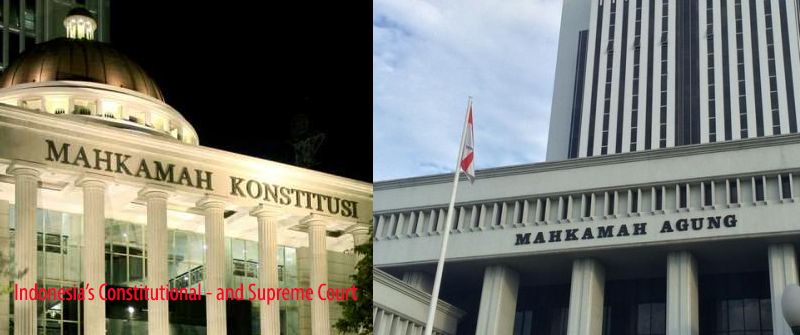
01 Sep Blog: Fights about judicial supremacy
By Adriaan Bedner
When in 2002 Indonesia established a constitutional court nobody anticipated just how important this new institution was going to be. Its rulings are widely reported and they have had an impact on fields ranging from economic policy and terrorism to family law. The Court’s activism seems to have positively affected its legitimacy. Even the arrest and conviction of Constitutional Court Chair Akil Mochtar for corruption in 2013-2014 appear to have left no permanent stain on the Court’s reputation. Unfortunately, its authority is currently being undermined by another legal institution that should be its foremost ally – the Indonesian Supreme Court.
It seems that the Supreme Court is not entirely happy with the deference that is due to the Constitutional Court. The most remarkable stand-off concerns the
Anti-Corruption Law: in several cases the Supreme Court refused to comply with Constitutional Court rulings. (For these previous cases see here and here.) The disagreement goes to the heart of the rule of law and it demonstrates how far Indonesia’s legal system is still removed from this ideal.
What is the case about? In 2006 a defendant in a corruption case at the East Jakarta District Court brought a claim before the Constitutional Court, requesting a review of Article 2(1) of the Anti-Corruption Law. This provision determines the following:
‘Each person who unlawfully [emphasis added] performs an act enriching himself, another person or a corporation, that may be detrimental to the state’s finances or economy, may be punished […]’
According to the official elucidation, ‘unlawfully’ here not only refers to an act in violation of a statutory provision, but includes an act that is ‘substantively unlawful’ – which means as much as an act that is ‘morally reprehensible’.
The Constitutional Court’s decision was straightforward in both its wording and its objective: while such an interpretation may be admissible in civil law, in criminal law it infringes the legality principle. It is unclear what the limits of accountability are. This undermines the position of the defendant, leaving him or her vulnerable to the whims of the judge. The Court therefore annulled the elucidation to the article concerned because it constituted a breach of the Constitutional right to legal certainty.
This was a clear and well-argued judgment. Normally speaking it should put an end to convictions for corruption without violation of written law. However, the Supreme Court decided differently. In 2007 the Court was asked to overturn a conviction on the basis of ‘substantive unlawfulness’. Referring to the ruling of the Constitutional Court, the judges agreed that Article 2(1) no longer had an elucidation. This meant, they argued, that they were now at liberty to interpret the provision anew. The surprising result was that the article would mean exactly the same as before. The Court felt no need to provide much of a justification: according to the judgment the ‘sens clair’ of the article was that it included morally reprehensible acts – exactly what the Constitutional Court had argued was an infringement of the right to legal certainty. (No. 003/PUU-IV/2006.)
In a debate on the issue during a seminar on 6 April this year, one of the Supreme Court justices involved tried to dismiss the impression that the Supreme Court had rejected the Constitutional Court’s ruling. All the Supreme Court wishes to do is to punish those guilty of corruption. Obviously, he said, the Supreme Court respected the Constitutional Court and this should be made clear to the wider public. To me, he seemed sincere. And this is perhaps even more worrying than if he had refused to recognise the Constitutional Court’s authority in the matter. Apparently, he seemed not even to realise that the Supreme Court overstepped the boundaries of its jurisdiction in a blatant manner.
The sens clair of this case is obviously that the Supreme Court is unwilling to accept the basic jurisdictional division between itself and the Constitutional Court. This undermines the authority of the legal system, and therefore in the end it is detrimental to the Supreme Court itself.
(Adriaan Bedner is associate professor at the Van Vollenhoven Institute for Law, Governance and Development (Leiden Law School, Leiden University) and the KITLV professor (by special appointment) of Law and Society in Indonesia.)




No Comments